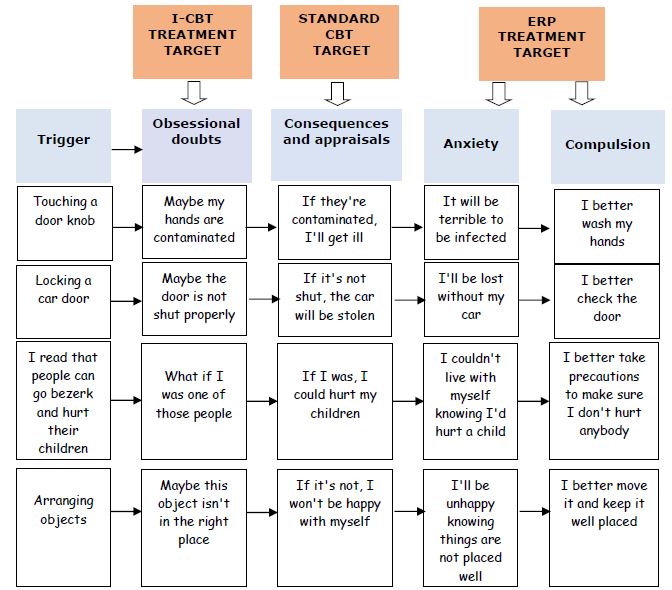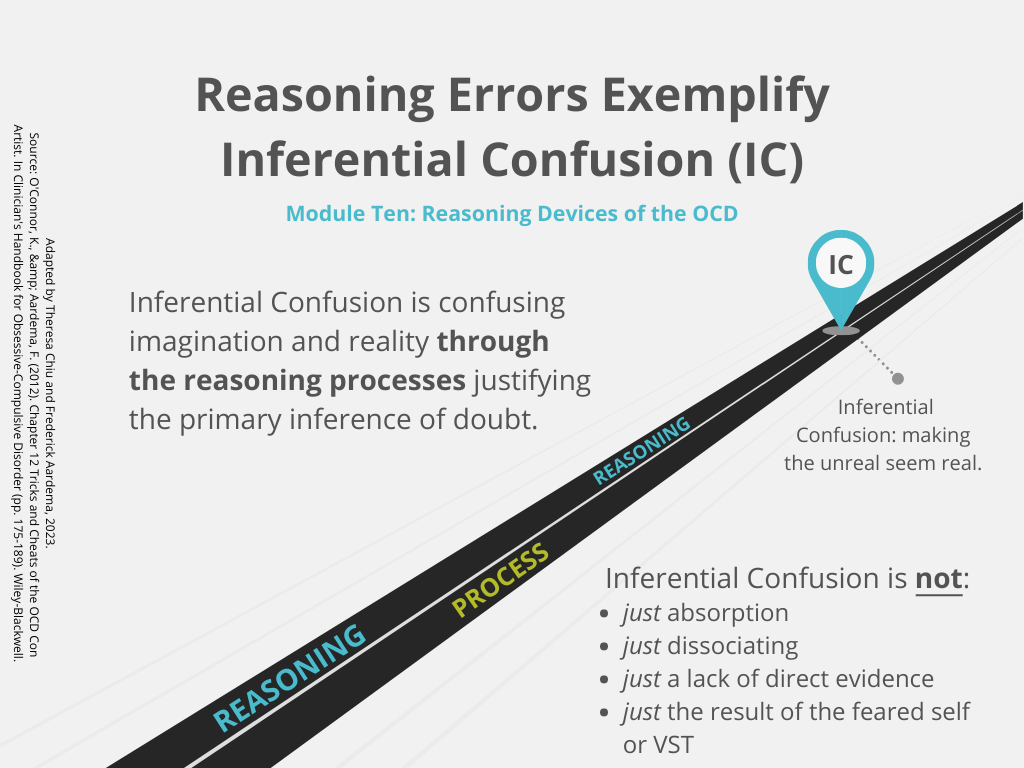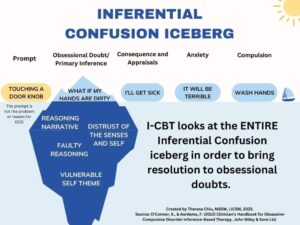What is I-CBT?
Inference-based Cognitive-Behavior Therapy (I-CBT) is an evidence-based treatment that is based on the central idea that obsessions are abnormal doubts about what “could be”, or “might be” (e.g. “I might have left the stove on”; “I might be contaminated”; “I might be a deviant”).
According to this approach, obsessional doubts do not come out of the blue, but they arise as the result of a dysfunctional reasoning narrative that is characterized by a tendency to distrust the senses and an over-reliance on the imagination.
As a result, obsessional doubts are able to persist without ever being resolved by carrying out compulsions.
What is I-CBT by Dr Frederick Aardema
I-CBT is a cognitive-behavioral treatment (CBT), but it is different from standard cognitive-behavioral approaches to the treatment of OCD.
Standard CBT is based on the idea that obsessions find their origin in random intrusive cognitions, which develop into obsessions depending on how the person interprets them.
For example, a person with a random intrusive thought about harming someone will develop obsessions only if these thoughts are negatively interpreted. Consequently, standard CBT is focused on helping clients to no longer mis-appraise or negatively react to these thoughts. It does not really address the initials thoughts preceding the appraisal.
I-CBT takes a different approach. While intrusive thoughts are normal, and they occasionally occur to everyone, obsessions are not viewed as originating from random intrusive thoughts. Instead, I-CBT views obsessions are as inferences or doubts that come about due to prior reasoning.
Obsessional doubts are problematic from the get-go, regardless of whether they appraised negatively after the fact.

I-CBT aims to bring resolution to obsessional doubts by teaching clients that obsessional doubts do not arise in the same way as normal doubts. Normal doubts come about for legitimate reasons, and are relevant to the here-and-now, whereas obsessional doubts never are.
Throughout treatment, clients are encouraged to trust their inner and outer senses, which leaves no room for obsessional doubts. Fortunately, those with OCD already reason just like everyone else in most non-obsessional situations, so there is nothing new to learn, except to apply the same to the obsessional situation.
There is a large body of scientific literature supporting the central claims of I-CBT, including randomized controlled trials that have shown I-CBT to be an effective treatment for the majority of those suffering from OCD.
I-CBT is also a promising alternative treatment option for those who have been unable to benefit from other treatments.
For further reading on the evidence-base for I-CBT, you are invited to visit the Research page.

Because of these differences in conceptualization, the treatment targets of I-CBT and standard CBT are very different. I-CBT focuses on the initial obsessions and how obsessions arise due to reasoning. Standard CBT focuses on the consequences or appraisals of obsession, or on anxiety and compulsions through exposure and response prevention techniques (ERP).
We can schematically represent this as follows:

Reasoning Confusion in OCD
While the most recognizable symptoms of OCD start with obsessional doubt, I-CBT goes back even further It’s not really the trigger in the obsessional sequence that causes the doubt. These are just prompts that set the sequence in motion. Instead, according to I-CBT, obsessional doubt comes about through an “inferential confusion”. – a confusion between reality and possibility during reasoning.
Inferential confusion is a reasoning confusion where the person with OCD treats abstract possibilities without any direct relevance to here-and- now as actual probabilities that need to be taking seriously. OCD is able to create this confusion through all kinds of clever tricks and cheats that are part of the reasoning story behind the obsessional doubt, which can make the unreal feel very real.
It is due to this confusion that those with OCD feel compelled to act on their obsessions.
Another reason behind obsessional doubts is that those with OCD are more vulnerable to inferential confusion because they carry a specific vulnerable self-theme – a specific area of life in which they do not fully trust themselves. Often, they are afraid of the person they might be, or might become if they do not carry out their compulsions.
I-CBT not only addresses the reasoning behind obsessions, but also fears related to one’s identity that can make a person more vulnerable to develop OCD to begin with.
In other words, I-CBT looks at the entire ICEBERG underlying obsessional doubts, not only its consequences.


Another important feature of I-CBT is that it does not include deliberate or prolonged exposure and response prevention (ERP). This behavioral technique consists of exposing oneself to feared objects and situations without engaging in any rituals or compulsions to overcome OCD. While ERP can be effective technique, not everyone can tolerate the distress caused by it, nor does everyone benefit from it.
I-CBT is a far more cognitive approach. It is specifically focused on the obsession and where it comes from so that obsessional doubt is resolved naturally without any effort. I-CBT does include some behavioral exercises, but these focus on trusting reality without experiencing anxiety.
Acceptance and commitment therapy (ACT) and mindfulness-based therapies and are also increasingly utilized in treatment of OCD. There is emerging scientific evidence that these treatment modalities can also be effective alternative treatment options for those with OCD.
However, I-CBT is not a generic treatment like most other treatments applied to OCD. It is a treatment that has been developed specifically for OCD and targets unique cognitive processes that are not directly addressed in other treatments.
If you want to know more about these similarities and differences of ICBT with other treatments, download the supplementary online material of our recently published multi-center trial that directly compared I-CBT with standard CBT and Mindfulness-based Treatment.